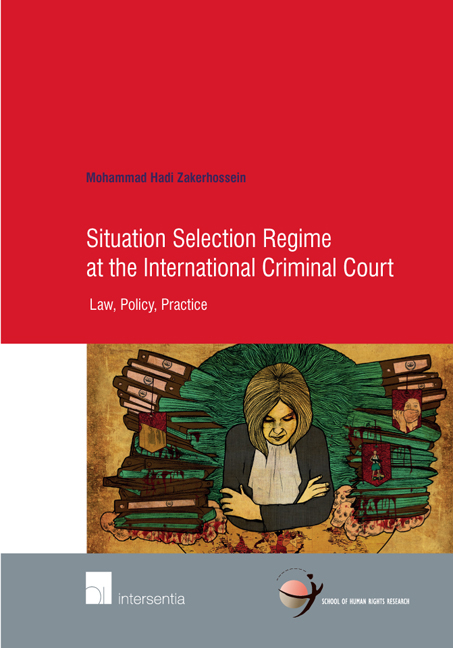Book contents
- Frontmatter
- Contents
- Acknowledgment
- Abbreviations
- General Introduction
- Part One Formulating the Concept of Situation in the Rome Statute Sense
- Part two Situation Selection Process
- Part three Situation Selection Criteria
- Part Four Situation Selection In Light Of Expressivism
- Conclusion
- Bibliography
- ICC Case Tables
- OTP Documents
- About the Author
- School of Human Rights Research Series
Part One - Formulating the Concept of Situation in the Rome Statute Sense
Published online by Cambridge University Press: 13 October 2018
- Frontmatter
- Contents
- Acknowledgment
- Abbreviations
- General Introduction
- Part One Formulating the Concept of Situation in the Rome Statute Sense
- Part two Situation Selection Process
- Part three Situation Selection Criteria
- Part Four Situation Selection In Light Of Expressivism
- Conclusion
- Bibliography
- ICC Case Tables
- OTP Documents
- About the Author
- School of Human Rights Research Series
Summary
The Rome Statute has manifested great originality in its procedural structure. The point of departure for the judicial activities of the ICC is a situation. The concept of situation is still something of a novelty. As an unprecedented notion, the concept of situation deserves more attention. The predominant body of literature on the ICC dealing with the situational issues hardly discusses to elaborate on the notion of situation. However, logically speaking, a conceptual question should precede normative inquiries. Indeed, the latter is affected by the understanding of the former. Situation in the Rome Statute is a construction that forms a procedural stage at the ICC's architecture, namely the situational phase. Moreover, to determine how a situation is and should be selected, we need to clarify the meaning of ‘situation’ first.
The concept of situation is not defined by the Rome Statute. In addition, the introduction of this notion was based on no precedent. Against the backdrop of the absence of a conventional definition and consensus understanding, the beginning part of this thesis aims at providing some insights into the concept of situation. At first, it shows that there is a distinction between the concept of ‘case’ which is a classical conception in criminal law and the notion of situation (chapter I.1), though there is still a nexus between them (chapter I.2). Then, the reasons for framing a new notion in the Rome Statute are set out (chapter I.3). The constituent elements of the concept of situation in the Rome Statute sense are uncovered in the final chapter of this part, namely the jurisdictional element (chapter II.1) and the factual component (chapter II.2).
- Type
- Chapter
- Information
- Situation Selection Regime at the International Criminal CourtLaw, Policy, Practice, pp. 23 - 26Publisher: IntersentiaPrint publication year: 2017

